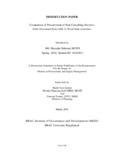| dc.contributor.advisor | Sundar, Banik Gour | |
| dc.contributor.author | Rahman, Md. Masudur | |
| dc.date.accessioned | 2018-01-14T05:00:42Z | |
| dc.date.available | 2018-01-14T05:00:42Z | |
| dc.date.copyright | 2016 | |
| dc.date.issued | 2016-03-26 | |
| dc.identifier.other | ID 16182011 | |
| dc.identifier.uri | http://hdl.handle.net/10361/9037 | |
| dc.description | This dissertation is submitted in partial fulfillment of the requirements for the degree of Masters in Procurement and Supply Management, 2016. | en_US |
| dc.description | Cataloged from PDF version of dissertation. | |
| dc.description | Includes bibliographical references (page 58). | |
| dc.description.abstract | The World Bank Guidelines and Public Procurement Rules-2008 are basically prepared
for the proper guidance of the procurement at the same time it also provides legal support
and a restrictive boundary for the parties involved in procurement. This dissertation mainly
deals with the comparison of these two guidelines regarding procurement of nonconsulting
services.
In Public Procurement there are generally three procurement categories: goods, works and
services. Services are classified as consulting services and non-consulting services. In some
cases, they are simply classified as services because of the difficulty, at times, in clearly
determining the difference. The distinguishing factor between the two, however, is the degree
of importance of the measurable physical output of the requirement.
This study covers those parts of the guidelines which are related to non-consulting services.
In World Bank guidelines non-consulting services have been clarified and procurement
process has been outlined. One sample bidding document has been published to facilitate the
procurement process. On the other hand Public Procurement Rules -2008 does not clarify the
non-consulting services. However there is some provision of procurement of physical
services, related services and stand-alone services. It is mandatory for all the public sector
procuring entities to follow the standard tender documents prepared by the CPTU, which
yet not published for procurement of non-consulting services.
The current scenario of procurement practice in the public sector has been studied through
interviews with procurement professionals working in World Bank financed projects
regarding non-consulting services. The analyses indicate that there is limited scope of
procurement of non-consulting services in the current public procurement rules-2008. For
WB guidelines, the current sample bidding documents needs to be update to overcome the
shortcomings.
And at last it can be said that the maximum guidance in the two guidelines are almost same
and there are some minor difference in some specific cases and this similarity eventually
helping the procuring entity to be accustomed easily with all the guidelines. | en_US |
| dc.description.statementofresponsibility | Md. Masudur Rahman | |
| dc.format.extent | 60 pages | |
| dc.language.iso | en | en_US |
| dc.publisher | BARC University | en_US |
| dc.rights | BRAC University dissertation reports are protected by copyright. They may be viewed from this source for any purpose, but reproduction or distribution in any format is prohibited without written permission. | |
| dc.subject | Procurement | en_US |
| dc.subject | Non-consulting services | en_US |
| dc.subject | Public procurement rules | en_US |
| dc.subject | World Bank | en_US |
| dc.title | Comparison of procurement of non-consulting services: public procurement rules-2008 Vs World Bank guidelines | en_US |
| dc.type | Dissertation | en_US |
| dc.contributor.department | BRAC Institute of Governance and Development, BRAC University | |
| dc.description.degree | M. Procurement and Supply Management | |

